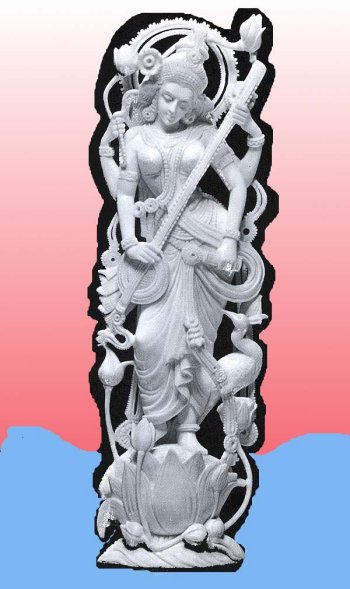
Basant Panchami heralds the
beginning of spring. Cool lingering breeze replaces the cold harsh winter
and there is a touch of rejuvenation and joy in the air. The buds of leaves
and flowers come into full bloom. Girls in different shades of yellow
dresses enhance the beauty of nature on the day of Basant Panchami. Kite
flying, a popular sport in India, is associated with the Basant Panchami
day. It is a day for the students no studies, only merry
making.
Basant means spring and
Panchami is the fifth day of the fortnight of waxing moon (Shukla Paksha)
in the month of January-February of English calendar (Magh). This
year (2001), the Basant Panchami falls on the 29th of
January.
The day of Basant Panchami is
dedicated to Goddess Sarasvati. It is not a national holiday in India but
the schools are closed and the students participate in decoration and
arrangement of the worship place. A few weeks before the celebration,
schools become active in organizing various annual competitions of music,
debate, sports and other activities. Prizes are distributed on the day of
Basant Panchami. Many schools organize cultural activities in the
evening of the Saraswati Puja day when parents and other community members
attend the functions to encourage the children.
Sarasvati is the goddess of
learning. Sarasvati bestows the greatest wealth to humanity, the wealth of
knowledge. In the Vedas the prayer for Sarasvati depicts her as a white lady
in white dress bedecked with white flowers and white pearls, sitting on a
white lotus, which is blooming in a wide stretch of water. She holds Veena,
a string-instrument, like Sitar, for playing music. The prayer finally
concludes, Oh Mother Sarasvati remove the darkness (ignorance) of my mind
and bless me with the eternal knowledge.
The Vedas describe Sarasvati
as a water deity, goddess of a river of the same name. According to
popular belief Sarasvati, originating from the Himalayas, flowed southeast,
ultimately meeting the Ganges at Prayag, near the confluence of Yamuna.
Hence the place is called Triveni. In due time this course of water
petered away.
The mythological history of
Sarasvati associates her with the holy rituals performed on the banks of the
river Sarasvati. She is worshipped as a goddess of speech, attributed
to the formation of Vach (words), invention of Sanskrit language and
composition of hymns.
In the United States, the
Bengali community observes Basant Panchami in the form of community worship
of goddess Sarasvati. It is usually organized on the following weekend.
Conservative Indians, however, prefer to celebrate it on the day of Panchami.
The communities organize cultural activities and the participation of kids
is encouraged.

![]()